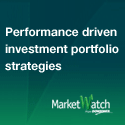Update: This post was included in the Carnival of Personal Finance #269
There exist a number of ways investors can screen for stocks. One of these ways involves screening for companies that exhibit high returns on equity (ROE). ROE is a very good yardstick by which to measure how well the management of a company creates value for its shareholders. However, as with everything the ROE statistics has it foibles and can be artificially inflated. To dig a bit deeper into what ROE is and how it translates into investment performance, we are super excited today to present to you an interview with a portfolio manager that relies heavily on the use of return on equity as a screening tool. His name is Jason Donville of Donville Kent Asset Management and he manages 2 funds on behalf of individual investors as well as select institutions, namely the Capital Ideas Fund, which was voted the Best New Fund in Canada for 2009 at the Canadian Hedge Fund Awards and the Financial Services Fund. Take a second to sign up to our RSS feed or to subscribe to our updates via email for a follow-up to this interview with Jason’s top stock picks in a few weeks time.
Biography: Jason has had an illustrious career as an award-winning analyst in both Asia and Canada. Prior to founding DKAM, Mr. Donville was consistently ranked as one of the top financial services analysts in the country. In 2004 and 2005, Mr. Donville was ranked in all three financial services research categories (banks, insurance and diversified financial services) in the annual Brendan Woods surveys. Mr. Donville was also recognized as the Top Stock Picker in Diversified Financial Services in the 2004 and 2005 National Post/Starmine surveys, and ranked number 3 for forecast accuracy in 2004 in the same survey.
Q: Warren Buffett has often pointed out that the return that a company gets on its equity is one of the most important factors in making successful stock investments. Mr. Donville, why don’t you start off by telling us why you consider the Return on Equity metric so important as opposed to Return on Assets or Price to Cash Flow?
A: We consider Return on Equity (ROE) to be the key starting point for any company we look at because we believe the key value driver of any company is its ability to earn a return on equity that is substantially higher than its cost of equity. However, we don’t simply stop at ROE. A company can achieve a high ROE in many ways and we use DuPont analysis to drill down into the ways in which a company earns a high ROE. Typically a high ROE (greater than 15%) can be achieved in one of three ways. These are 1) leverage 2) margins or 3) asset turnover. We generally avoid highly levered companies. About 95% of the companies we own have high profit margins and about 5% have high asset turnover ratios. Typically, companies with high ROE’s also have high ROA’s but we start with ROE first because it requires less adjustments when screening large numbers of companies. We consider Price to Cash Flow to be a valuation metric and valuation is the second but separate stage of our investment process.
Q: There area number of ways to calculate ROE from the most simple being Net Profit ÷ Average Shareholder Equity to the more complex DuPont Model, which is Profit Margin (Profit/Sales) * Total Asset Turnover (Sales/Assets) * Equity Multiplier (Assets/Equity). Mr. Donville, which of these formulas do you utilize in your calculations of ROE or is it a variant/combination of these?
A: We use both. In our main database we use net profit/average common shareholders equity to screen large populations of stocks. But once we see something we like we use DuPont analysis to drill down and understand where a companies ROE is coming from. We consider DuPont analysis to be one of the most valuable tools in the entire investment world.
Q: In addition to a high ROE, what other valuation/operating metrics do you pay close attention to, Mr. Donville? Additionally, when assessing a company’s viability as an investment, do you find discounted cash flow analysis (DCF) helpful or do you rely primarily on values that are readily ascertainable on a company’s balance sheet?
A: We look at working capital management because we find that there are times when it is difficult to be objective about a company’s management. Working capital management (inventory days, accounts receivable management, etc) is like a form of DNA for a company – its their signature of how good they are as managers that they cant hide. We also think quality of management is important but you need to have repeated exposure to management to get a really good read as to which managers know their stuff and which don’t. When we are just starting out with a new company, working capital management is a good proxy because good managers typically run tight ships and this is reflected in working capital management.
From a DCF perspective, we have a calculator that we use that is based on EVA (Economic Value-Added) analysis and it is very good at showing us how valuable a high ROE company is. That said, when we find a company with an ROE of say 20% and its trading on a PE ratio of less than 10 and has a low dividend payout ratio, we know before we even look at our DCF/EVA model that its extremely undervalued.
Q: How do you generate your investment ideas?
A: We try to read a lot of research and troll through a lot of databases looking for high ROE companies. Once we find them we try to meet with management as quickly as possible and we try to ascertain how sustainable the high ROE is. Once we are convinced that we have found such a company we start buying the stock.
Q: We try to read a lot of research and troll through a lot of databases looking for high ROE companies. Once we find them we try to meet with management as quickly as possible and we try to ascertain how sustainable the high ROE is. Once we are convinced that we have found such a company we start buying the stock.
A: Alpha can come from many sources and we view our core competency as being stock pickers. We generally don’t use much leverage but we use a lot of concentration. Our top 5 positions typically account for 50% of the entire portfolio and our top 10 names would account for 75% of the portfolio. We have shorts on from time to time but we see ourselves as primarily a long fund.
Q: Before we head to your views on the equity markets, Mr. Donville, I wanted to ask you a question on position sizing. Outside of using options and derivates, I think the sizing of positions in one’s portfolios is integral to controlling risk. What are your thoughts on this subject, Mr. Donville and what criteria do you use to decide the size of stakes you acquire in companies?
A: We tend to hold highly concentrated positions but we also tend to buy stocks on the way up. We rarely if ever average down and we never buy a large position all at once. We want to see the upward movement in the stock validate that we are correct in assuming that the said company is undervalued.
Q: In your July 2010 newsletter (the ROE Reporter), Mr. Donville, you opine that the pessimism we have been hearing about is overdone and that you think the Canadian and US markets are heading higher. While there appears to be a tug of war between the bulls and bears with regards to inflation/deflation and the state of economy, there appears to be clear evidence from multinationals that emerging markets is where the growth is at. My question for you Sir is how much exposure do you have to the emerging markets in your portfolio and to what particular sectors?
A: Neither of my funds has an emerging market mandate.
Q: Finally, what books have you read in recent years that have stood out as valuable additions to your investment library?
A: I have a voracious appetite for investment books and if you come to my office you will see that my book shelves are stuffed with investment books. Two books I have read recently that I would highly recommend are as follows. The first is The Great Reflation: How Investors Can Profit From the New World of Money by Tony Boeckh who has been the brains behind the Bank Credit Analyst for more than 30 years. This book provides a very thorough overview of the macroeconomic factors that have gotten us to where we are today and Boeckh’s writing style is very engaging. The second book that I have read is The Big Short by Michael Lewis which is ostensibly about the subprime meltdown in the US. However, like so many other books by Lewis such as Liar’s Poker, The New New Thing, Moneyball and The Blind Side, half the value of this book is in its story telling style. I think Lewis is as gifted a writer as Malcolm Gladwell and Lewis is arguably stronger when it comes to telling long intricate stories that require the reader to stay engaged for 300 pages or more. I also would recommend anything written by Michael Mauboussin , Aswath Damodaran, and Ron Chernow, all three of whom I rate extremely highly.
Thank You, Mr. Donville!
Do you pay attention to the ROE when researching an equity? Let us know what you thought of this interview or anything else about the site in the comments.









